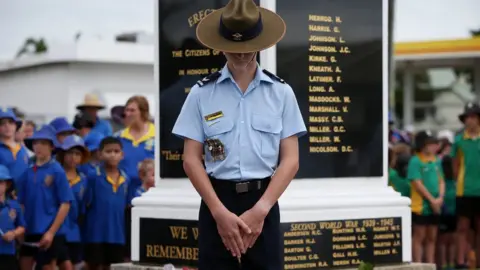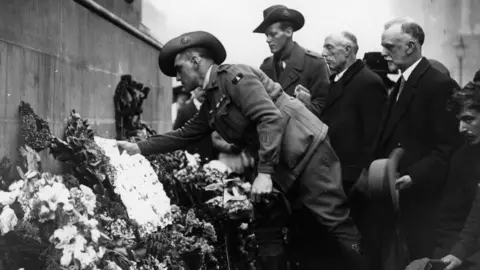Coronavirus: Australia and New Zealand cancel Anzac Day services
 Getty Images
Getty ImagesAustralia and New Zealand have cancelled joint Anzac Day commemoration events at Gallipoli amid fears over the spread of coronavirus, officials say.
Services to mark the countries' participation in World War One will no longer take place on 25 April.
Thousands of military personnel from Australia and New Zealand lost their lives after landing at Gallipoli Cove in Turkey in 1915.
Solemn ceremonies are held every year to commemorate veterans and soldiers.
The countries had earlier banned large gatherings and asked their citizens overseas to return home.
New Zealand Prime Minister Jacinda Ardern said the Gallipoli services had become "a pilgrimage of sorts for many New Zealanders".
"But with global travel restrictions and isolation requirements in place in most countries it is simply not practical to hold this year's event," she added in a statement on Tuesday.
Australia's Minister of Veterans' Affairs, Darren Chester, said he regretted the decision to cancel the events, but that some services could still go ahead.
"We'll Just have to do it differently. We'll have to live-stream events. We'll have to make sure we are providing opportunities for people to still respect our veterans," he told broadcaster ABC TV.
Traditionally, services include the Anzac Dawn Service, the Australian Lone Pine Service, international wreath laying ceremonies and the New Zealand Service at Chunuk Bair in Turkey.
What does Anzac Day represent?
It marks the anniversary of the first campaign that led to major casualties for the Australia and New Zealand Army Corps (Anzac) during World War One.
On 25 April 1915, soldiers from both countries landed at Gallipoli Cove in Turkey, part of an Allied effort to capture the peninsula from the Ottoman Empire.
Collectively termed Anzacs by a military clerk keen to fit the name on a rubber stamp, the acronym stuck.
 Getty Images
Getty ImagesAfter an eight-month campaign, the Allies retreated in defeat after heavy losses on both sides. More than 87,000 Turks died, along with an estimated 44,000 men from the British Empire and France, including about 8,500 Australians and nearly 3,000 New Zealanders - one in four of the Kiwis sent to Gallipoli.
It was the Anzacs' first major engagement on the world stage, fought by the grandfathers and great-grandfathers of today's Australians and New Zealanders.
The first Anzac commemorations were held in 1916. These have morphed into big-budget productions in Australia, New Zealand and Turkey.
